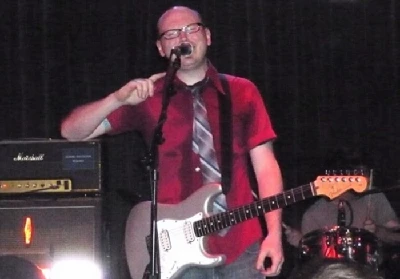published: 21 /
2 /
2011

Chicago-based punk band the Smoking Popes include Morrissey amongst their fans. Front man Josh Caterer talks to Lisa Torem about his band's reformation in 2005 after a seven year absence and 'This is Only a Test', their new album
Article
“I thought that album was extraordinary, the most lovable thing I’d heard in years,” said Morrissey about the Smoking Popes' 1995 album, 'Born to Quit'. He had conjured up a list of his thirteen favourite albums to celebrate Friday the 13th; this one stood up boldly against the likes of Patti Smith ('Horses') and Iggy & the Stooges ('Raw Power').
Yet, this Chicago-area band of brothers plus one (the band have lived through multiple percussionists since their formation in 1991), had a sound unlike the average ranting, irreverent punk band. Matt, Josh and Eli Caterer, named after biblical characters,had certainly been exposed to the usual punk discographies, but had also been widely influenced by the smooth balladry of Frank Sinatra and Tony Bennett.
You might say that Josh Caterer, the vocalist, guitarist, chief songwriter and middle-child, was the Isaac Newton of his generation. What started out as an experiment; singing like someone his grandmother would have swooned over, become a clever confluence of styles. Sentiments of love and remorse trumped anger and spite. The raspy spittal often associated with the punk movement got subterfuge by Josh Caterer’s mellifluous tones.
In 1994 the Smoking Popes opened for Green Day and had already received national recognition when ‘Need You Around’ appeared on the soundtrack of the film 'Clueless'. Their first album, 'Get Fired', from the year before had already revealed their ability to form tight-knit, nuanced pop-punk melodies.
“I owe you for this perfect night,” Josh sings, warmly, in ‘Midnight Moon’ from 'Born to Quit' – an elegant pastiche of romance and glamour. But, the ambitious 'Destination Failure' from 1997, boasting 16 tracks, drew on far. more gut-wrench.
“Suddenly I recognized those bloodshot, rear-view window eyes,” sings Josh, in ‘Megan'. The strident guitar in ‘Pretty Pathetic’ served as a visceral template for deeper personal anguish; The Smoking Popes trace the downward spiral of a once-thriving relationship in catastrophic detail.
When the band reunited, in 2005, after a seven- year split, due to major label troubles, and Josh’s discovery of Christianity, their devoted fans breathed a sigh of genuine relief. When they performed at Chicago’s popular club, Metro, the tickets sold out in a mere 36 minutes.
Back with a brand new album, 'This is Only a Test', Josh Caterer spoke to Pennyblackmusic about his family ties, career challenges and new projects.
PB: The band has undergone a number of line-up changes since your first drummer Dave Martens left the group. Has it been challenging reworking repertoire with drummers coming and going through the years?
JC: It’s been interesting because every drummer has a different feel and they bring a different energy to the music. We’ve been lucky to work with some really great drummers over the years, but I think Neil Hennessy, our present drummer, is the best fit for us. He’s the drummer we’ve been waiting for all along.
PB: Josh, your influences, in terms of male singers, range from Liberace to Tom Waits. Have your tastes changed since the group began? How many incarnations has your vocal style gone through?
JC: I thought Liberace was just a piano player. I wouldn't say he influenced my singing, but he did have a great hairstyle. And Tom Waits is pretty much the coolest guy on earth. He’s discouragingly cool. You look at him and you say, “I’ll never be that cool. I guess I’ll just have to settle for what I’ve got.”
My musical taste is still basically the same as it’s always been. I like good singers who sing good songs. It doesn't matter what style of music it is. A good song is a good song, and a good singer is somebody who doesn't need an auto-tuner.
PB: You formed the side project Duvall in 2001 and released the album, 'Volume and Density' in 2003. Did this album differ greatly from the Smoking Popes discography?
JC: Musically, I think Duvall was pretty consistent with the Smoking Popes catalogue. We weren’t trying to break new ground in that sense. The big difference was the lyrics. I wanted to express my faith in Jesus without being too preachy. I guess you could say that Duvall was a Christian version of the Popes.
PB: Are you at odds with any of the Smoking Popes material since you have shifted direction?
JC: Not really. Most of the old Popes stuff doesn’t conflict with me at all. There are only a couple songs I won’t sing anymore, but those are songs that wouldn’t be missed from our live set anyway.
PB: ‘Pretty Pathetic’ is one of the band’s most emotional songs; “You should have heard me sobbing” is one line that illustrates that pain and the phrase, “permanently changed” really brings home the point that the narrator is devastated. Was this song specifically about a personal break-up?
JC: Yeah, that song was very autobiographical and it took a long time to write. I probably spent a month working on it. There was an early version that was much more up-tempo and had a more traditional verse/chorus kind of structure, but it never clicked and I kept changing it. I had a feeling that there was something in there that I was trying to tap into but I just couldn’t get it. At one point, I even went off by myself and checked into a motel for three days and just worked on the song, but I still couldn’t get it.
Then one night I finally got so frustrated I said, “Forget the song, I’ll just write the story” and very quickly I wrote a few paragraphs, off the top of my head, all about this horrible break-up that really devastated me when I was nineteen. I decided to keep those words exactly as they were and write the music around them.
PB: Why did “Destination Failure” take so long to be released? It has been considered one of the band’s most remarkable songwriting efforts, with the best energy and hooks to match.
JC: Thanks. We spent a few months making the record, then Capitol, our label at the time, told us they wanted more songs, so I did some more writing and we went back into the studio. Then they told us they wanted to postpone the release indefinitely for some reason. Eventually, they put the record out but they didn't do anything to promote it or support us at all. It was not a great situation.
PB: The band broke up for about seven years and it has been suggested that it was because you had discovered Christianity and wanted to go off in a new musical direction with Duvall and the 'Volume and Density' album? Were the sibling relationships strained during this time? Secondly, will the tracks off this album find their way into the band’s repertoire?
JC: My brothers were very supportive of me. In fact, Eli actually joined Duvall and played on the 'Volume and Density' record and also on 'O Holy Night' which was our Christmas record. But Duvall was a separate thing. It wouldn't feel right for the Popes to perform those songs, although I do sometimes play them when I do acoustic shows.
PB: In 2003, a Smoking Popes tribute album was produced. The Ataris covered, ‘Pretty Pathetic’, Bad Astronauts covered ‘Megan’ and Saturday Supercade covered ‘Paul’. How did you feel about your songs being covered and were there any favorite renditions?
JC: That album is a lot of fun. I thought the version of Megan had some cool stuff in the arrangement that I wish we had actually thought of in the first place.
PB: The band worked closely with producer Phil Bonnet. Why did you part ways and how did he influence your songwriting?
JC: We didn’t part ways. Phil died in 2001 right after we finished making our fourth album, 'The Party’s Over', with him. He was a great friend and a very talented guy. I’m sure we’d still be working with him today if he was around.
PB: The band is known for writing some deeply personal material, yet 'The Party’s Over' contained covers which included tunes like: ‘Zing Went the Strings of My Heart’ and ‘You’ll Never Walk Alone.’ The label rejected the album. Did you submit this album material intentionally to break your contract with Capitol Records or did you just want to take a break from writing?
JC: Getting out of our contract with Capitol was definitely part of it. But we were also genuinely excited about interpreting those songs. The idea was that it would be kind of like our version of Willie Nelson's 'Stardust' album where he covers all those great standards. This was basically our homage to Willie, which made it seem all the more fitting to include one of his songs on the album.
PB: The band produced the video, ‘I Know You Love Me’, at the Metro nightclub in Chicago enlisting the help of a local theatre company. How did you come up with the idea to use actors? Were you happy with the results?
JC: We were friends with the Defiant Theater Company because my wife had been in some of their plays. We asked them if they could put something together for us. It needed to be cheap because we were paying for it ourselves, so we decided to make it one continuous shot and the actors would keep moving in and out of frame with all these props. I think they did an amazing job of choreographing the whole thing.
PB: 'This is Only a Test” is your first concept album. Why were you so intrigued with the idea of writing about a fictional high school student?
Was it challenging to create an album in which the songs are tied up thematically?
JC: I heard a song on the radio that was by one of those teen pop stars, and it occurred to me that even when I was a teenager I never totally wrote from a teenage point of view. I was always trying to pretend I was a little more sophisticated. So wouldn't it be funny, now that I'm in my 30s, if I started writing songs about being a teenager? As soon as that thought struck me, I started getting ideas for the songs. They came really quickly. Thirty minutes later, the first song was finished, and I wrote a song a day for five days. The rest of the record took a little longer to write, but it was still part of that initial wave of inspiration.
Having a theme is actually incredibly liberating. You don't have to sit around and ask yourself, “Okay, what in the world should I write a song about now?” You know what the box looks like and you're looking for things that are goning to fit in that box.
PB: Should we take the title seriously? Will you be creating more concept albums and how will this influence your stage performances?
JC: Are you suggesting something like 'This Is Only a Test: The Musical'? Broadway, here we come! I'd be happy to do more concept albums in the future if the right concept comes along. I'll just follow the muse and see what happens.
PB: What’s next for the Smoking Popes?
JC: More touring, more recording, more touring. The beat goes on!
PB: Thank you.
Picture Gallery:-

